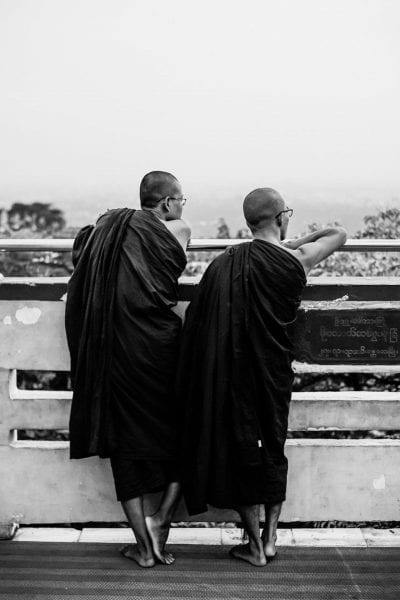November 12, 2021 “Buddhist Nationalism in Myanmar” with Prof. Rollie Lal
Dhammapada Ch. 1 “In this world hostilities are never appeased by hostility. But by the absence of hostility are they appeased. This is an interminable truth.”
Buddhist nationalism in Burma is the transformation of religion into an ethnic, cultural identity. The philosophical teachings of the Buddha are fundamentally peripheral to the group. Moreover, Buddhist philosophy is disturbingly reinterpreted to follow a fascist ideology, and then relabeled as Buddhist nationalism. In this context, we must ask how this has happened?
In Myanmar, religion and ethnicity have combined to form a hostile environment for minority groups. The Muslim Rohingya and Kachin Christians in Myanmar face harsh discrimination by the dominant Buddhist Bamar ethnic group, a situation that has deteriorated in recent years. While hundreds of years ago these differences were generally accepted, the drawing of post-colonial borders created the Rohingya as a minority inside a minority in Myanmar. The Rohingya resided in Myanmar from as early as the 15th century, with Muslims continuing to arrive in the 19th and 20th centuries. Despite the long history of Muslims in Myanmar, the government of Burma/Myanmar historically denied their claims as an official ethnic group of Myanmar. The lack of legal designation led to the Rohingya being labeled illegal immigrants from Bangladesh. Systemic oppression of the Rohingya led to an increase of tensions between the Rohingya and the Buddhist community in Rakhine State.[1]
World War II exacerbated the existing tensions between the communities. The Buddhist Burmese leadership and the Muslim Rohingya were on opposing sides of the war. Burmese Buddhists joined the Japanese fight to rid Myanmar of British colonial control, while the Muslims joined the British against the Buddhist/Japanese alliance. This hardened the feelings of ill will, with the Buddhist Nationalists arguing that this was proof that the Rohingya were anti-national and British collaborators.
In the next decades, after the democracy movement gained ground, the Buddhist nationalists became concerned that Muslims would start taking more power under democracy. Buddhist nationalist support for military rule grew. Then in 1982, the Citizenship Law excluded Rohingya (but included 135 groups), making them stateless.
Then in 2017, terror attacks by the Arakan Rohingya Salvation Army (ARSA) against the Myanmar police led to a conflagration. ARSA killed 12 security personnel, but the government of Myanmar responded with disproportionate violence. Human rights organizations accused the government and local men of rapes, crucifixions, and burnings.[2] The violence sent hundreds of thousands of refugees streaming into neighboring Bangladesh. In the following weeks and months, the Myanmar army claimed that it was defending the state against Muslim terrorists. Burmese Nobel Laureate Aung San Suu Kyi also refrained from condemning the apparent genocide. By 2021, over 900,000 Rohingya were living in refugee camps in Bangladesh. Another estimated 600,000 remained in Myanmar in Rakhine State under intolerable conditions.[3] As of 2021, the Myanmar government refused to grant the Rohingya citizenship, a decision that made the minority stateless refugees.
Despite the fact that the Burmese Nationalist interpretations are not supported by Buddhist text, they have significant impact on the treatment of women in the country. Women in the Burmese context are often told that they need to be reborn as a man in order to achieve merit. Impoverished women are susceptible to human traffickers and join prostitution as an alternative to achieve merit for their families through suffering.[4] Many even “believe that they are destined to be prostitutes and lower-class citizens because it is their karmic retribution.”[5]
The gender hierarchy in Myanmar Buddhism is also supported by the growing nationalist movement. Buddhist women in Myanmar are expected to be the protectors of racial purity in a highly patriarchal system. Nationalists passed a set of laws in 2014 known as the “Protection of Race and Religion Laws,” which both criminalized polygamy and required people wishing to convert to obtain official permission. In addition, interfaith marriages would need to pass a public opinion vote to be accepted.[6] This concept supports the notion that women are the protectors of racial purity, and if women convert or engage in an interfaith marriage they have sullied the Buddhist race. The underlying philosophy claims that women are inherently inferior. According to a nationalist Buddhist, “Our Buddhist women are not intelligent enough to protect themselves.”[7] An underlying shift in cultural and religious beliefs would be necessary to address issues of gender inequality in Myanmar.
Buddhist monks are surprisingly at the front of this violence. Ashin Wirathu is leading Buddhist nationalists against the Muslim Rohingya. He claims that they are a Saudi-backed Bangladeshi insurgency that wants to create a caliphate in Myanmar. His group, MaBaTha speaks about ethnicity and religion as though they are interchangeable. The group itself sprouted from the anti-colonial movement against the British in the 1920s. Amyo, Batha, Thathana (MaBaTha) stood for “Race, language, and religion!”[8] Over time, the movement shifted its focus from the British to the Muslims.
Twisted Religious Interpretation
These ethno-nationalist monks recast the Buddha as a nationalist religious leader of the Sākiya bloodline (clan). In this rewriting of history, the Myanmar/Burmese people claimed descent from the Buddha’s Sākiya Clan. Burmese women were not to mix blood (intermarry) with others to keep the country strong. The “others” became demonized as a threat to the ethnic and religious purity of the Buddhists.[9] The Buddhist nationalists drift even further from Buddhist theology by claiming that the Buddha was himself an ardent nationalist. According to this argument, the Buddha, “Acting in a selfless way, he sacrificed himself for the greater good by performing the five ‘great sacrifices’, for instance, by offering his children, his limbs, or his body for the sake of others, as a way to fulfill the perfection of generosity.”[10] In this description, the Buddha was indeed selfless in the traditional Buddhist interpretation. However, the nationalist view takes his sacrifice a step further by adding a purpose to the sacrifice that is selfish and not supported by any Buddhist text. “The self-effacing practices of the bodhisatta path can, in a nationalist reinterpretation, be perceived to be similar to the selfless and heroic sacrifice of oneself for one’s country and nation common in nationalist movements throughout the world.”[11] This nationalist perspective runs counter to Buddhist philosophy, which denies the existence of race or ethnicity as relevant. Instead, the theology emphasizes the impermanence of all attachments. This would preclude any attachments or sacrifices made in favor of an ethnic group, nation, or even family.
By attaching Buddhist philosophy to an ideology that elevates an ethno-religious group inside Myanmar, the Buddhist nationalists are disturbingly similar to the racial fascists of World War II. While the Nazis blamed Jews for all of the wrongs in Germany, the Buddhist nationalists of Myanmar similarly blame the Rohingya Muslims and Burmese Christians for the ills of Myanmar. Their solution of ethnic cleansing is also in line with other racial fascist movements.
Often, this type of fascist thought is discussed in terms of Christianity and Islam, and even Judaism. Buddhism is most often given a pass as a “peaceful” religion. However, addressing the upheaval and human rights abuses in Myanmar will requires analysis of the use of Buddhism as a weapon in Burmese political culture. Combating human rights abuses inside Myanmar will require ending the misuse of religion, disputing the nationalist rhetoric, and elevating a peaceful interpretation of Buddhism.
[1] Office of the UN High Commissioner for Human Rights, “Fact-Finding Mission on Myanmar.”
[2] Lara Jakes, “Genocide Designation for Myanmar Tests Biden’s Human Rights Policy,” The New York Times, June 30, 2021, https://www.nytimes.com/2021/06/30/us/politics/biden-genocide-rohingya-myanmar.html.
[3] “Rohingya,” Human Rights Watch, https://www.hrw.org/tag/rohingya#.
[4] Grisel d’Elena, “The Gender Problem of Buddhist Nationalism in Myanmar: The 969 Movement and Theravada Nuns,” (MA diss., Florida International University, 2016).
[5] D’Elena, “Gender Problem.”
[6] Francis Wade, Myanmar’s Enemy Within, (Zed Books, 2019): 170.
[7] Wade, “Enemy Within,” 171.
[8] Randy Rosenthal, “What’s the Connection between Buddhism and Ethnic Cleansing in Myanmar? Lion’s Roar, November 13, 2018, https://www.lionsroar.com/what-does-buddhism-have-to-do-with-the-ethnic-cleansing-in-myanmar/
[9] Niklas Foxeus, “The Buddha Was a Devoted Nationalist: Buddhist Nationalism, Ressentiment, and Defending Buddhism in Myanmar,” Religion, Vol. 49 (4), May 2019.
[10] Foxeus, “The Buddha.”
[11] Foxeus, “The Buddha.”

